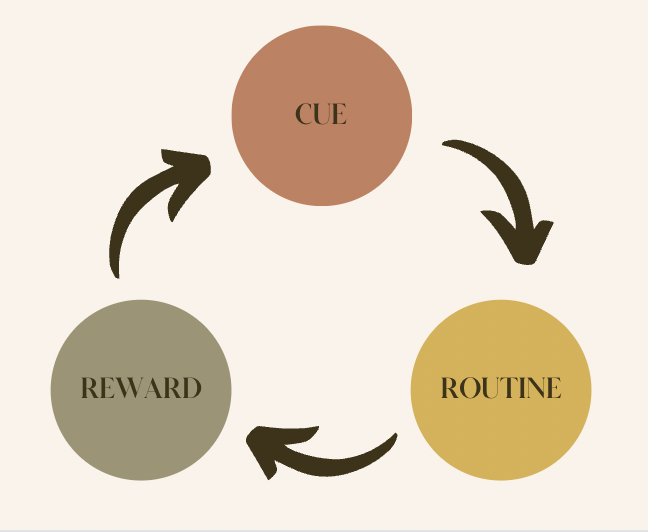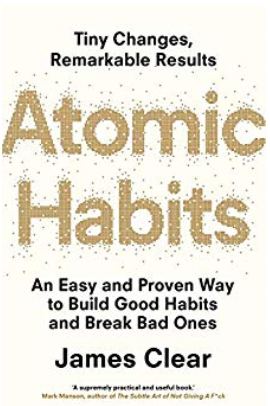The Science of Making and Breaking Habits
“We first make our habits, and then our habits make us.”
- Frederick Langbridge
We humans are — without a doubt— creatures of habit. You may not even be aware of the daily habits you've picked up over the years. According to research by cognitive psychologists and neurobiologists, between 40 to 95% of human behaviour (including our thoughts, words, and actions) fall under the category of habits. In other words, we are on auto-pilot for approximately half of our daily activities. Consider a skill you mastered that took time to get right, such as learning how to ride a bike. At first, biking might have been challenging and required a lot of mental effort. However, after you got used to it, it became a lot easier. You might even say that it became habitual.
By definition, habits are automatic behaviours that we engage in repeatedly in the same environment and are controlled by our subconscious minds. Many people find that having a routine or a habit makes life simpler. It gives the impression that one has greater control over their life. It’s important to note that habits can be harmful or health-promoting. For instance, feeling stressed while working on a project can trigger you to smoke a cigarette or use other substances which can have detrimental effects on your health in the long run. On the other hand, going to the gym 3-4 times a week or taking daily walks can be quite beneficial.
How are Habits Formed?
Every habit begins with a three step psychological pattern known as the habit loop:
The Cue
A cue or a trigger instructs your brain to switch to automatic mode and let an action or behaviour take place. Generally speaking, cues may be classified as belonging to one of the following categories:a place, time of day, the people around you, an emotional state or an action. For instance, someone could have a craving for candy from the vending machine in the adjacent building at the same time every day, or they might be compelled to get a coffee after smelling the aroma coming from the coffee shop downstairs.
The Routine
The routine refers to the habit or a repeated behaviour. It’s the thing you do that might be difficult to stop. Although you presumably made a conscious decision to pursue that action the first few times you performed it, habitual behaviours often happen unconsciously. For instance, checking social media first thing in the morning, walking to the cafeteria to buy a cup of coffee and chocolate chip cookie every morning on your way to class, or brushing your teeth every night before bed can all be a part of someone’s routine.
The Reward
A reward provides positive reinforcement that encourages the brain to recall the habit loop, thus raising the likelihood that you will repeat the behaviour in the future. Some rewards can be beneficial to a person. For instance, brushing your teeth after breakfast gives you a clean, fresh mouth and eliminates coffee breath. Alternatively, a daily habit of consuming excessive amounts of sweets might temporarily increase happiness attributable to the release of dopamine and serotonin, but over time, it can have a negative impact on your physical health by increasing your risk of developing diseases like diabetes and suffering from tooth decay. Rewards can range from tangible items like chocolate, to conceptual items like a television break, or items with no objective value other than the fact that they are being given.
Can the Habit Loop Be Broken?
It may seem difficult to break old habits since your brain constantly chooses the route that presents the least amount of resistance, but habits can be changed. There are many different strategies you can try that might help you break a particular habit loop and develop new, healthier habits:
Determine What Triggers Your Negative Habit:
Is it a particular cue that initiates the habit? Make a note of the following when you get sucked into an unwanted routine. Soon enough, you are likely to start recognizing patterns:
Location (i.e. home)
Time (i.e. after work)
Individuals around you (i.e. your ex)
Emotional state (i.e. were you stressed, sad or angry?)
The last action you performed (i.e. binge eating or smoking)
Avoid The Trigger:
Avoiding the cue or trigger that keeps you in that loop is the simplest method to break a bad habit. Remove yourself from the situation and distract yourself with a healthier alternative. For example, if you need to unwind, practise mindfulness and meditation instead of smoking. Rather than consuming your fourth cup of coffee for the day when you need energy, eat a banana instead.
Make A Bad Habit Challenging:
Habits can develop when a behaviour is simple enough to practise and repeat. Making the behaviour challenging will prevent you from engaging in it.
Set Realistic Goals:
The famous adage “go big or go home” may apply while doing some tasks, but not while trying to make or break habits. Always start small, set reasonable goals, and never take on more than what you can handle. If you wish to lose weight, for example, start with working out 2-3 times a week for 30 minutes. As time goes on and your body gets accustomed to this new routine, you can increase the duration and intensity of your workouts. Similarly, if you wish to eat a healthier diet, do not eliminate entire food groups all at once. Try gradually lowering the amount and swap unhealthy meals with more nutritious recipes.
Develop A Game Plan:
Use a journal to keep track of your progress. Include a start date, the methods you'll use to modify the behaviour, and a mechanism to track your success and setbacks. Be aware of any internal resistance that might come up for you and prevent you from making progress. It’s important to really tune in to and understand your motivation for changing a particular habit so that you continue to feel motivated even if it gets challenging.
Celebrate Each Win
Whether your wins are big or small, they are worth celebrating. Celebrate each milestone that you reach and hurdles that you overcome. You can reward yourself or add incentives. Introducing positive reinforcement will make you feel good and keep you inspired to reach your goals.
Recommendations
Here is a selection of books, podcasts and applications that you can use to create and maintain healthy habits:
Apps:
Way of Life is a free app available on Apple and Android devices. This habit tracker that motivates you to build a better, stronger and healthier you. The app allows you to input the habits you track as either a complete routine or a singular habit. You can even add notes to your habits and see what’s working and what isn’t to refer back to it.
Streaks is the standout habit tracking app for iPhone users. It is simple to learn and quick to use while offering enough options for tracking daily, weekly and monthly habits.
Podcasts:
The Habit Coach Ashdin Doctor takes us through the creation of simple easy to do habits that can be incorporated into one’s daily life in these bite-sized (less than 5 minute) podcasts. Habits around health, sleep, de-stressing, productivity, nutrition and relationships are all discussed.
Habits of success Host Ian Warner provides with all the knowledge you need to build better habits and achieve goals in his podcast.
Habits on Purpose Created to empower high achieving women create habits and live a life you love.
Books:
Atomic habits can reshape the way you think about progress and success and may provide you the tools and strategies needed to transform your habits.
Tiny Habits is an instruction manual for making big changes in small steps. Stanford habit expert BJ Fogg draws on two decades of research and coaching to share proven methods for making lasting change. Fogg presents a system that tackles behavior shifts in increments. Tiny habits involve less risk and allow practitioners to ease into new lifestyles, however these small adjustments can add up over time and turn into big results. Tiny Habits simplifies the science behind behavior into easy-to-understand equations and figures, and offers exercises that help readers act on and practice the theories..



